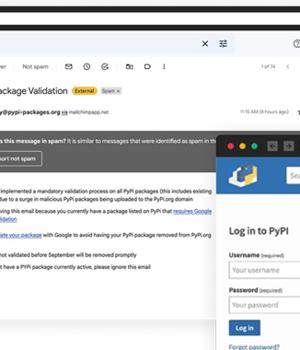Security News > 2022 > August > PyPI Repository Warns Python Project Maintainers About Ongoing Phishing Attacks

The Python Package Index, PyPI, on Wednesday sounded the alarm about an ongoing phishing campaign that aims to steal developer credentials and inject malicious updates to legitimate packages.
"This is the first known phishing attack against PyPI," the maintainers of the official third-party software repository said in a series of tweets.
The social engineering attack entails sending security-themed messages that create a false sense of urgency by informing recipients that Google is implementing a mandatory validation process on all packages and that they need to click on a link to complete the validation before September, or risk getting their PyPI modules removed.
"These releases have been removed from PyPI and the maintainer accounts have been temporarily frozen," PyPI said.
Developers who believe they may have been compromised should reset their passwords with immediate effect, reset 2FA recovery codes, and review PyPI account logs for anomalous activity.
Earlier this month, researchers from Checkmarx disclosed two malicious Python packages - typing-unions and aiogram-types - that impersonated popular packages typing and aiogram to trick developers into downloading them and infecting their machines with Cobalt Strike.
News URL
https://thehackernews.com/2022/08/pypi-repository-warns-python-project.html
Related news
- Phishing platform 'Lucid' behind wave of iOS, Android SMS attacks (source)
- iOS devices face twice the phishing attacks of Android (source)
- Windows NTLM hash leak flaw exploited in phishing attacks on governments (source)
- Three Reasons Why the Browser is Best for Stopping Phishing Attacks (source)
- Phishing detection is broken: Why most attacks feel like a zero day (source)
- DPRK Hackers Steal $137M from TRON Users in Single-Day Phishing Attack (source)
- Low-tech phishing attacks are gaining ground (source)
- MintsLoader Drops GhostWeaver via Phishing, ClickFix — Uses DGA, TLS for Stealth Attacks (source)
- Focused Phishing: Attack Targets Victims With Trusted Sites and Live Validation (source)
- CTM360 Identifies Surge in Phishing Attacks Targeting Meta Business Users (source)